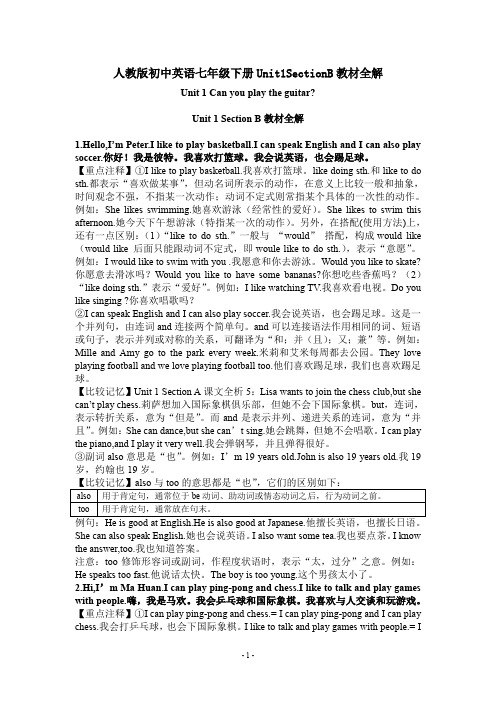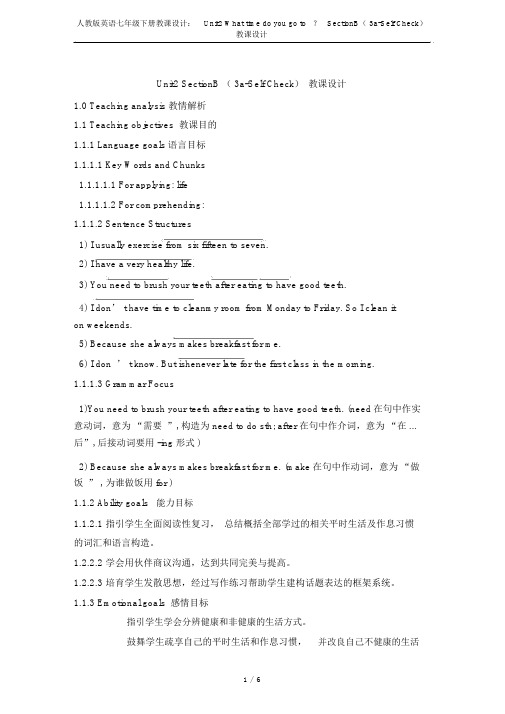人教版初中英语七年级下册Unit2SectionB教材全解
人教版英语 七年级下册 Unit2 SectionB reading 课件

√___ go to bed early
___ eat ice-cream
___ eat quickly
√___ eat vegetables √___ play sports √___ take a walk
Tony and Mary are brother and sister.
Look at the pictures and guess who is healthier(更健康)?
gets home, he always _d_o_e_s_ __h_is_ __h_o_m_e_w__o_r_k first. In the evening, he_e_i_th_e_r_ watches TV
__o_r_ plays computer games. At ten thirty, he _b_ru_s_h_e_s_ his_t_e_et_h__ and then he _g_o_es__
homework
watches __________ TV or plays computer games brushes goes At 10:30 __________his teeth and __________ to
bed
Tony doesn’t get up __ea_r_l_y_.He _g_e_ts__ _u_p__ at eight. He _g_o_e_s __to__ s_c_h_o_o_l__ at eight thirty. He doesn’t have time_f_o_r_ breakfast, so he
Unit2SectionB词汇讲解课件2021-2022学年人教版英语七年级下册

我们应该每天锻炼身体。 We should take exercise every day. 我们经常在英语课上做练习。 We often do exercises in English class.
exercise的一词多义:
•do/take exercise •做运动;锻炼 •do eye exercises •做眼保健操 •do math exercises •做数学练习题
quarter n. 一刻钟;四分之一
他一刻钟以后到达了。 He arrived after a quarter. 地球(表面)约四分之三被水覆盖。 About three quarters of the earth is covered with water.
quarter的一词多义:
一刻钟
四分之一
• either... or...连接两个名词或代词作主语时,谓语动词应该与离其最近 的那个名词或代词在人称和数上保持一致,也就是遵循“ 就近原则”。 Either you or your sister has to stay at home. 要么你,要么你妹妹必须待 在家里。
• 与your sister(保持数的一致) • either还可作副词,意为“也”,用在否定句的末尾。
•人教版英语七年级下 册Unit 2 Section B 词汇讲解
exercise v.& n.锻炼;练习
• exercise在此处作动词,意为“锻炼”。 • 我的爷爷奶奶天天锻炼身体。 • My grandparents exercise every day. • exercise还可作名词,常见用法如下: • 不可数名词 • 表示“锻炼;运动”,常和take, do, get等词连用 • 可数名词 • 表示“一套动作”或“练习,习题”,如do morning exercises做早操
(完整版)人教版初中英语七年级下册Unit1SectionB教材全解

人教版初中英语七年级下册Unit1SectionB教材全解Unit 1 Can you play the guitar?Unit 1 Section B教材全解1.Hello,I’m Peter.I like to play basketball.I can speak English and I can also play soccer.你好!我是彼特。
我喜欢打篮球。
我会说英语,也会踢足球。
【重点注释】①I like to play basketball.我喜欢打篮球。
like doing sth.和like to do sth.都表示“喜欢做某事”,但动名词所表示的动作,在意义上比较一般和抽象,时间观念不强,不指某一次动作;动词不定式则常指某个具体的一次性的动作。
例如:She likes swimming.她喜欢游泳(经常性的爱好)。
She likes to swim this afternoon.她今天下午想游泳(特指某一次的动作)。
另外,在搭配(使用方法)上,还有一点区别:(1)“like to do sth.”一般与“would”搭配,构成would like (would like 后面只能跟动词不定式,即woule like to do sth.),表示“意愿”。
例如:I would like to swim with you .我愿意和你去游泳。
Would you like to skate? 你愿意去滑冰吗?Would you like to have some bananas?你想吃些香蕉吗?(2)“like doing sth.”表示“爱好”。
例如:I like watching TV.我喜欢看电视。
Do you like singing ?你喜欢唱歌吗?②I can speak English and I can also play soccer.我会说英语,也会踢足球。
Unit2SectionB3aSelfCheck课件人教版七年级英语下册2

Self check
A taste clean have get take brush
B your teeth my room
a walk good dressed a good job
用你组成的短语补全句子,完成教材上Self Check中的第 一部分。
1. Ice-cream usually t_a_s_t_e_s__g_o_o_d_ so students like to eat it after school.
B:S__h_e_u_s_u_a_l_ly__g_e_ts_u__p_a_t_5_:_4_5__in__th_e__m__o_rn__in_g____. (5:45)
A:W__h__y_d_o_e_s_s_h_e__g_et__u_p_s_o__e_a_rl_y____? (why/get up/so early)
One possible version
I have a healthy life. I usually get up at seven. I exercise from a quarter past seven to half past seven. Then I have breakfast and brush my teeth. I go to school at eight o’clock. I have lunch at twelve o’clock. I get home from school at half past four and do my homework. I have dinner at six then I watch TV. I go to bed at nine thirty.
(完整版)人教版英语七年级下册教案:Unit2Whattimedoyougoto?Secti

人教版英语七年级下册教课设计: Unit2 What time do you go to ? SectionB( 3a-Self Check)教课设计Unit2 SectionB ( 3a-Self Check)教课设计1.0 Teaching analysis 教情解析1.1 Teaching objectives 教课目的1.1.1 Language goals 语言目标1.1.1.1 Key Words and Chunks1.1.1.1.1 For applying: life1.1.1.1.2 For comprehending:1.1.1.2 Sentence Structures1)I usually exercise from six fifteen to seven.2)I have a very healthy life.3)You need to brush your teeth after eating to have good teeth.4)I don’ t have time to cleanmy room from Monday to Friday. So I clean iton weekends.5)Because she always makes breakfast for me.6)I don ’ t know. But ishenever late for the first class in the morning.1.1.1.3 Grammar Focus1)You need to brush your teeth after eating to have good teeth. (need在句中作实意动词,意为“需要”,构造为 need to do sth; after 在句中作介词,意为“在 ...后”,后接动词要用 -ing 形式 )2) Because she always makes breakfast for me. (make在句中作动词,意为“做饭” , 为谁做饭用 for )1.1.2 Ability goals能力目标1.1.2.1 指引学生全面阅读性复习,总结概括全部学过的相关平时生活及作息习惯的词汇和语言构造。
英语人教新目标七年级下册Unit2Section B (2a – 2c)

Advice(建议):
get up early/on time have breakfast slowly eat fruit and vegetables
Mary eat ice-cream after dinner
Don’t eat ice-cream after dinner
精致卓越 大气开放 品质绵外 担当未来
(4)eats hamburgers for lunch
(5)plays basketballfor half an hour
does homework
(6)
first
(7)either watches o games
(8)at 10:30 _b_ru_s_h_e_s_t_e_et_h_ (9)then__g_o_e_s_t_o_b_e_d______
Teaching aims
Preparation
1.Master key words and Text book Page 11
phrases.
Notebook
2.Talk about healthy and Pen
unhealthy habits.
3. Improve reading skills.
Retell
Tony's Daily Routine
at 8:00
goes _t_o___s__c_h__o__o__l_____
at noon
plays basketball for half an___h__o_u__r______
in the brushes teeth and goesevening to bed________________
After school
2020春七彩课堂人教版初中英语七年级下册教学课件Unit 2 Section B 1a-1e

take a walk
clean my room
UNIT 2 SECTION B
1a Match the activities with the time of day.
3
1
2
4
UNIT 2 SECTION B
1b check your answers with your partner.
UNIT 2 SECTION B
Paris New York
in the morning in the afternoon in the eveningUNIT 2 SE NhomakorabeaTION B
get up half past six
-When do you usually get up in the morning?
-I usually get up at half past six.
4. 我父母通常早上8点钟去工作。
My parents usually __g_o__ t__o__ work _a_t__ 8 o’clock __in__ the morning.
5. 我的小黑狗每天晚上9点睡觉。
My little black dog __g_o_e_s__t_o_ b__e_d__
a quarter past nine go to bed
-When do you usually go to bed in the evening?
-I usually go to bed at a quarter past nine.
UNIT 2 SECTION B
run
have dinner
2. 他通常什么时候去上学?
_W__h_e_n_ _d_o__e_s__ he usually __g_o_ _t_o_ s_c__h_o_o_l_?
人教版七年级英语下册教学课件(RJ) Unit 2 Section B (1a-2c)

…don’t like to get up early
… usually eat very quickly
… for lunch, I usually eat hamburgers
…watch TV or play computer game
… at ten thirty… I go to bed
—When does Tom usually …? — He usually …
—When does Tom usually …? — He usually …
when 和 what time 的区别
what time: 问时间,一般指具体时刻。 when: 问时间,既指具体时刻,也指大的时间。
美国有许多著名的电影明星。
3. 1) be good for… 表示“对……有益”; be bad for… 表示“对……有害”。
例如:
It’s good for our health to go to bed early and get up early. 早睡早起对我们的健康有好处。
It’s good for… 对……有益 It’s bad for… 对……有害
In the evening, I either watch TV or play computer games. At ten thirty, I brush my teeth and then I go to bed. Mary is my sister. She usually gets up at six thirty. Then she always takes a shower and eats a good breakfast. After that, she goes to school at eight thirty.
- 1、下载文档前请自行甄别文档内容的完整性,平台不提供额外的编辑、内容补充、找答案等附加服务。
- 2、"仅部分预览"的文档,不可在线预览部分如存在完整性等问题,可反馈申请退款(可完整预览的文档不适用该条件!)。
- 3、如文档侵犯您的权益,请联系客服反馈,我们会尽快为您处理(人工客服工作时间:9:00-18:30)。
人教版初中英语七年级下册Unit2SectionB教材全解Unit 2 What time do you go to school?Unit 2 Section B教材全解past six in the morning早上六点半【重点注释】①half作为名词或代词,意为“一半,半数”,是可数名词,其复数形式是halves。
例如:Please cut the apple in half.请把这个苹果切成两半。
Half of ten is five.十的一半是五。
Cut the apple into halves.把苹果切成两半。
【拓展记忆】表示“某物的一半”用“half a (an)+单数名词”结构。
例如:half an hour半小时 half a kilo半公斤 half an orange半个橘子②past作介词,意为“(在时间、地点、范围上)超过”。
例如:half past two 两点半 ten(minutes) past six六点十分 It’s twenty past seven.现在是七点二十分。
The hospital is about a mile past the school.医院在过了学校的一公里处。
【拓展记忆】past作介词时,还可表示“超过(某年龄)”。
例如:an old man past seventy七十多岁的老人quarter past three in the afternoon在下午三点十五(三点一刻)a quarter to seven in the evening在晚上六点四十五(七点差一刻).【重点注释】①quarter作名词,意为“一刻钟;四分之一”,a/one quarter “一刻钟;四分之一”;three quarters =three fourths四分之三。
例如:Please wait for a quarter.请等一刻钟。
There are four of us,so wo cut the orange into quarters and each eats a piece.我们共有四个人,因此我们吧橘子切成四等份,每人吃一份。
②to作介词,意为“(在时间上)差”,“(几点)差(几分)”,结构是:分钟数(超过30分钟,即分钟数>30分钟)+to+整点(整点+1),意思是“几点差几分(几点零多少分钟)”。
例如:six to five 四点五十四分(五点差六分)【比较记忆】past 与to表示时间:①用past(过,超过)表示时间时,有三种表达法:1)half past+整点,表示“几点半”。
例如:half past nine/eleven/three九点/十一点/三点半 2)分钟数(不超过30分钟,即分钟数<30分钟;如果=30分钟,要用half past+整点;如果分钟数>30分钟,不能用past而要用to“差”来表示)+past+整点,意思是“几点(过)几分”。
例如:ten past ten 十点十分 two past two两点零二分 twenty-five past eight八点二十五分fifteen(a quarter) past four四点十五3)a quarter past +整点,表示“几点(过)一刻”。
例如:a quarter past three三点一刻(三点十五分)a quarter past nine九点过一刻(九点十五分)②用to(差,不到)表示时间时,有两种表达法:1)分钟数(超过30分钟,即分钟数>30分钟;如果=30分钟,要用half past+整点;如果<30分钟,要用分钟数+past+整点,即“几点(过)几分”)+to+整点(点时间+1),表示“几点差几分”。
例如:two to two两点差二分(一点五十八分)thirteen to ten十点差十三分(九点四十七分)five to twelve十二点差五分(十一点五十五分)2)a quarter(正好15分钟) to +整点(整点+1),表示“几点差一刻”。
例如:a quarter to three三点差一刻(二点四十五分)a quarter to eleven十一点差一刻(十点四十五分)注意:有“half past+整点”的说法,但没有“half to+整点”的说法。
【归纳记忆】时间的表达方式:数词用基数词。
①整点表达法:如果时间是整点,可以直接用钟点数或在钟点数后加o’clock来表达。
例如:at six (o’clock)②“钟点数+分钟数”表达法:先说钟点,再说分钟,直接罗列。
例如:five twenty-five③(参见以上【比较记忆】)“分钟数+past/to+钟点数”表达法:30分钟以内,用“分钟数+past +钟点数”表达,例如:5:25;30分钟以上,用“分钟数(60-分钟数)+to+钟点数(下一个钟点数,即钟点数+1)”表达,例如:5:40。
另外,在分钟数中,正好30分钟,用“half past+整点”来表达;正好15分钟,即“几点过一刻,或几点差一刻”用“a quarter past/to+整点”来表达。
homework做家庭作业【重点注释】homework是不可数名词,一般不加冠词。
在词组do homework中可以使用形容词性物主代词(do one’s homework),也可不用。
例如:He has a lot of homework.他有许多家庭作业。
I do my homework every day.我每天做作业。
He usually does his homework before dinner.他经常晚饭前做作业。
【拓展记忆】housework是不可数名词,指“家务劳动;家务活”。
例如:My mother does housework every day.我妈妈每天都做家务。
4. eat dinner/breakfast吃晚/早饭【重点注释】eat breakfast/lunch/dinner表示“吃早/午/晚饭”,也可以用have 来表示“吃”。
例如:Let’s eat/have our dinner.咱们吃饭吧。
It’s time to eat/have breakfast.到吃早饭的时间了(该吃早饭了)。
5.——When do students usually eat dinner?学生们通常什么时候吃晚饭?——They usually eat dinner at a quarter to seven in the evening.他们通常晚上六点四十分吃晚饭。
【重点注释】①本句是由疑问副词when引导的特殊疑问句,when意思是“什么时候,何时”。
例如:——When is your birthday,John?约翰,你的生日是那一天?——My birthday is February6th.我的生日是2月6日。
When do you usually get home?你通常什么时候到家?When can you come?你什么时候能来?②英语钟点时刻的表达方式:1)采用基数词表达时间。
例如:seven thirty7:30 seven fifteen七点十五 seven forty-five七点四十五2)采用介词past,to 表达时间。
一般说来半个小时以内,常用介词past,表示“几点过几分”;半小时过后,常用介词to,表示“差几分到几点”。
例如:a quarter past eight 半点一刻 half past六点半。
twenty-five to five差二十五分五点③AM和 PM:AM表示“午前,上午”(午夜12:00后至中午12:00);PM表示“午后,下午”(中午12:00后至午夜12:00前)。
在使用时,常用小写形式am和pm.在美式英语中,使用形式为.和.6. do my homework做我的家庭作业【重点注释】do one’s homeworkyiwei “做某人的家庭作业“。
do作动词,意为“做;干”,指做具体的工作,强调动作、行为。
其后的宾语常常是lesson,work,homework,exercise等。
其中one’s 代表形容词性物主代词,在句中根据前面的主语选用相应的物主代词。
例如:She wants to help his sister do her homewok.他想帮助他妹妹做家庭作业。
He doesn’t do his homework on Sunday.他在星期天不做家庭作业。
注意:do one’s homework中的do充当实义动词,变否定句时,要借助于助动词do或does。
my room打扫我的房间【重点注释】此处elean是动词,意思是“把……打扫干净”。
例如:She is cleaning the bedroom now.现在他正在打扫卧室。
【拓展记忆】clean还可作形容词,意思是“干净的,清洁的”。
例如:Are your hands clean?你的手干净吗?a walk散步【重点注释】①此处take a walk=have a walk=take/have walks=walk意为“散步”,与have a walk/go for a walk.同义,“take a+名词”表示与该名词意义相关的动作。
take常和名词连用,意为“做……事情”,表示与该名词意义相关的动作。
例如:Let’s take a walk.让我们散步吧。
I want to take a rest.我想休息一下。
Can I have a look?我可以看看吗?【拓展记忆】take表示“乘,坐”某一交通工具。
例如:He takes a bus to go to school every day.他每天乘公共汽车上学。
often takes a train to work.②walk作可数名词,意为“步行,行走”。
例如:How about going for a wlk (go for a walk“去散步”)?出去散散步,如何?She usually takes a walk after supper.她经常在晚饭后散步。
He took the dog for a walk.他带着狗去散步。
【拓展记忆】1)walk作名词,还可意为“步行的距离”。
例如:The station is ten minutes’walk from my house.车站离我加要步行十分钟2)walk作动词,意为“步行,行走”例如:He walks to school every day.他每天步行去上学。
We walk home.to bed early早睡 get up early 早起(Hi,I’m don’t like to get up early你好!我是托尼。
